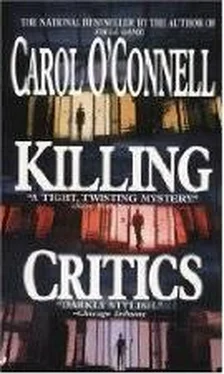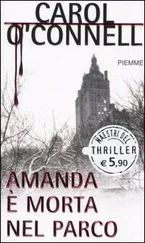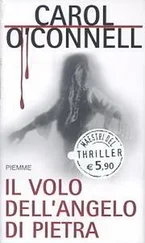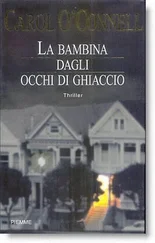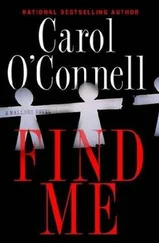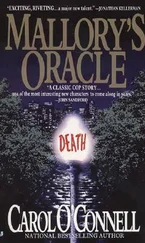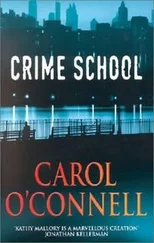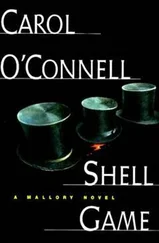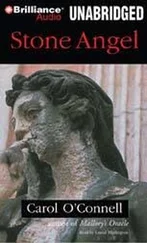Carol O’Connell - Killing Critics
Здесь есть возможность читать онлайн «Carol O’Connell - Killing Critics» весь текст электронной книги совершенно бесплатно (целиком полную версию без сокращений). В некоторых случаях можно слушать аудио, скачать через торрент в формате fb2 и присутствует краткое содержание. Жанр: Триллер, на английском языке. Описание произведения, (предисловие) а так же отзывы посетителей доступны на портале библиотеки ЛибКат.
- Название:Killing Critics
- Автор:
- Жанр:
- Год:неизвестен
- ISBN:нет данных
- Рейтинг книги:3 / 5. Голосов: 1
-
Избранное:Добавить в избранное
- Отзывы:
-
Ваша оценка:
- 60
- 1
- 2
- 3
- 4
- 5
Killing Critics: краткое содержание, описание и аннотация
Предлагаем к чтению аннотацию, описание, краткое содержание или предисловие (зависит от того, что написал сам автор книги «Killing Critics»). Если вы не нашли необходимую информацию о книге — напишите в комментариях, мы постараемся отыскать её.
Killing Critics — читать онлайн бесплатно полную книгу (весь текст) целиком
Ниже представлен текст книги, разбитый по страницам. Система сохранения места последней прочитанной страницы, позволяет с удобством читать онлайн бесплатно книгу «Killing Critics», без необходимости каждый раз заново искать на чём Вы остановились. Поставьте закладку, и сможете в любой момент перейти на страницу, на которой закончили чтение.
Интервал:
Закладка:
When he finally stood back from the window, he wore the most foolish grin a human could wear outside of captivity. His hair was soaked through, and now he realized he was standing on broken glass. It had just dawned on him that his soles were bleeding, when he noticed the object at his feet-masonry which he hoped was a chunk off someone else’s building. A bit of paper was bound to it by string. He knelt down and untied the wet knot, carefully unfolding the limp paper as though it were a precious relic. He lifted his message to the window. By this poor light, he read the words, “I’m sorry.”
When he considered the source, this was nearly poetic. And to think, he had once criticized her for not having a jot of romance in her soul, or for that matter, a soul. And who but Mallory would have come up with the original idea of tendering an apology by rock?
In its original form, the newspaper clipping had been Sabra and Gregor Gilette’s wedding portrait from the society pages. It had shown only a small part of the bride’s face, only one eye unobscured by her flowers. Half that photograph stared back at Emma Sue each night from the ornate picture frame on the bedside table. She had cut off Sabra’s side of it in the way of a jealous lover. How she had hated Gregor’s wife. And yet, perversely, her most prized possession was one of Sabra’s paintings.
In her young years, before she had become a mover and shaker in the New York art world, Emma Sue Hollaran’s taste in art had always run contentedly with reproductions of Americana by the painter from Maine. His work was as quiet and unchallenging as wallpaper in the portraiture of neighbor folk and peaceful landscapes of an America that she never lived in, a made-up place that she might visit for a moment before turning out the lights.
All those years ago when she had seen the first of Sabra’s paintings, she had physically recoiled. It was the shock of cold water and the disorientation of a sleepwalker called rudely awake. It thrilled her. Sabra had painted a place that Emma Sue had known in her fantasies. The work was done in vibrant reds. The upper portion was a jagged raging violence and the lower part, a rolling, bleeding passivity. She stared into the painting, believing for one full second that she might actually enter it.
Untutored in abstract art, she had forced representation onto the canvas, and reorganized the atmosphere of raw sex, until the violence became a tumultuous fiery sky, roaring over the gently sloping earth below. Rushing across the red plain in the distance, coming ever close, was a churning blood storm. This, too, was another country. It was young, and it was passionate. She remembered it well from dark rooms where she had sat alone with imaginary men who really loved her.
The painting had been hung on her bedroom wall all those years ago. Even when she had come to hate Sabra, Emma Sue could never bring herself to destroy the painting. All these years later, she still found herself staring at it for hours, her head pressed into the pillows, hand hesitating on the lamp switch, watching, waiting for the passionate blood storm to come, in the delusion that, for her, it had not already passed her by.
She turned off the lamp and plotted in the dark.
Gregor would be sorry, very sorry .
Mallory had doffed her ball gown and her yellow taxi cab. Long after midnight, she had returned to what she was, a cop in blue jeans, carrying a large gun in a shoulder holster and striding across a rooftop on the east side of town, ten flights in the air.
Riker waved one arm to say hello. He had his binoculars trained down on the roof of Bloomingdale’s across the street. He was focussed on the thing beneath the makeshift canopy of raincoats. The wind whipped at the canopy, and a coat flapped up to expose the mannequin in the silver ball gown. Andrew Bliss was tenderly draping the plastic figure with a raincoat, as though he thought she might be cold.
“Strange little guy,” said Riker.
“What’s he doing?”
“I think he’s starting a new religion. Right now he’s lighting a candle in front of a giant Barbie doll.”
Mallory took the binoculars, and watched Andrew light the tall formal candles of a silver candelabra set on a table before the mannequin. “It does look like an altar, doesn’t it?”
She had been schooled in two religions, Jewish and Catholic. Both lit candles, but this little rite of Andrew’s was closer to the church than the temple. Now Andrew was making the sign of the cross. It was this very act, performed unconsciously as a child, which had tipped Helen Markowitz off to her real mother’s religion, and the foster mother had felt an obligation to condemn Kathy Mallory to four years of parochial school.
“Riker, how much food do you think he has in that little fridge?”
“No food. I saw him open it an hour ago. It’s packed with wine and one bottle of water. There’s no sign of food anywhere.”
“Take off, Riker. Get some sleep.”
“G’night, Mallory.”
After the rooftop door had closed on Riker, Mallory plugged in her directional microphone and scanned the roof, counting up wine bottles. When she focussed on Andrew again, he was stumbling to his bedding of quilts. He must be tired and weak from the dearth of food and the glut of wine. Yet he did not sleep except in starting fits. He was having nightmares, if Mallory understood those screams. She could remember a childhood of screaming herself awake in the night as Andrew did all the night long, until the candles failed, burning to the nubs and going out.
When he woke again, an hour shy of daylight, he discovered his melted candles, and he went ballistic. She watched him tearing through his entire stock of goods until he found another candle. He lit it and went back to sleep.
Curious.
It wasn’t fear of the dark. Electric light bloomed everywhere on the roof. She counted ten lamps tied by a network of extension cords. The candles must mean something more to him.
Just before daybreak, he fell into an exhausted sleep with no more screams, and he did not wake again before Mallory left him.
Gregor Gilette remained in Godd’s Bar until closing time. Then he sat in an after-hours bar until near sunup, pondering the possibilities of dark genius.
When he did go home to his Fifth Avenue residence, he was weary in so many ways. He went to the large kitchen at the back of the apartment. He selected a bottle of red from the wine rack and carried it through the rooms, slowly working the screw into the cork.
Gregor unlocked the door of the only room in the apartment which his housekeeper was not obliged to clean. He entered his den and sat down in a chair opposite the enlarged image of a bloody severed head. He casually fumbled in a drawer for his cigar cutter. Behind his chair, Aubry’s murdered face, in full color with open, staring dead eyes, seemed to watch as he struck a match to a Cuban cigar, and then poured his wine into a goblet.
He turned to his left, seeking an ashtray. He was so accustomed to the wall covering on that side of the room, he never even glanced at it. From the baseboard to the ceiling molding, the wall was splashed with a collage of photographs and yellowed newspaper clippings, held in place by nails driven into plaster. Four of the photographs were large and glossy, in full color, and the predominant color was the blood of wounds.
The young woman in the photographs was more recognizably human in the newspaper clippings below. Each clipping told much the same story. Each said, in much the same wording, that here was a wildly talented young dancer who was going somewhere in this world.
There were retractions printed in articles at the base of the wall, which said in varied garish tabloid headlines that they had lied; she had died; she would never go anywhere now.
Читать дальшеИнтервал:
Закладка:
Похожие книги на «Killing Critics»
Представляем Вашему вниманию похожие книги на «Killing Critics» списком для выбора. Мы отобрали схожую по названию и смыслу литературу в надежде предоставить читателям больше вариантов отыскать новые, интересные, ещё непрочитанные произведения.
Обсуждение, отзывы о книге «Killing Critics» и просто собственные мнения читателей. Оставьте ваши комментарии, напишите, что Вы думаете о произведении, его смысле или главных героях. Укажите что конкретно понравилось, а что нет, и почему Вы так считаете.
